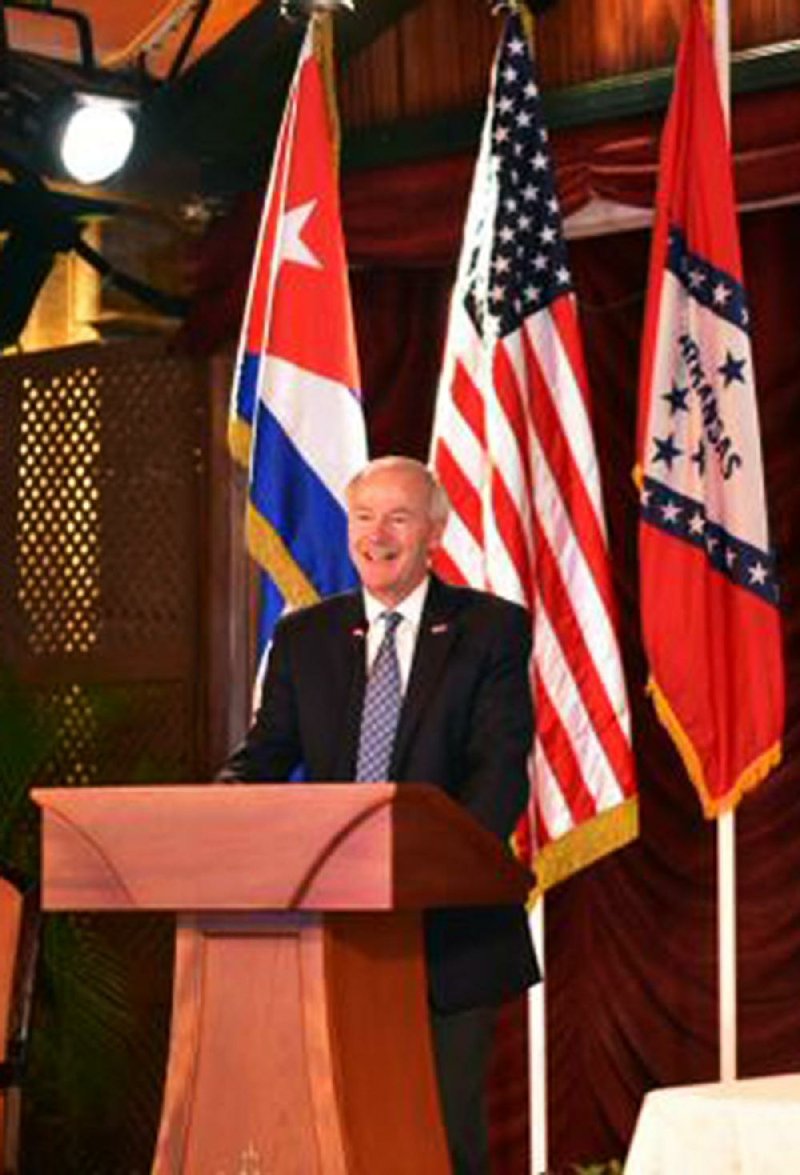Gov. Asa Hutchinson said Tuesday from Havana that there are opportunities for Arkansas companies to do more business in Cuba but cautioned they won't develop overnight.
"This is a gradual, step-by-step process," Hutchinson said. "The first step in my judgment is to authorize credit sales to Cuba, and that would open up the doors of opportunity for Arkansas products."
Hutchinson is leading a delegation of government and business leaders who are exploring ways Arkansas companies can increase trade with Cuba as relations between that country and the United States improve. Arkansas' rice and poultry producers are particularly eager to sell more of their products to Cuba.
Even under the limitations of the U.S. embargo, U.S. companies export hundreds of millions of dollars' worth of food, health care products and agricultural commodities to Cuba each year. But current federal law prohibits financing exports to Cuba and requires cash payment upfront, hampering the ability of farmers and ranchers to sell their products to the island nation.
President Barack Obama has called on Congress to lift the legislative ban on trade with Cuba, but the White House has acknowledged that it is unlikely to happen because of opposition from Republican lawmakers who say President Raul Castro's government is a brutal dictatorship that should continue to be isolated.
The two countries have restored diplomatic relations, and on Tuesday, Obama met with Castro at the United Nations to discuss ways they can deepen cooperation. Obama urged Castro to open Cuba's economy and respect human and political rights, The Associated Press reported.
Castro said in a Monday address to the U.N. General Assembly that relations wouldn't be fully normal until the U.S. lifts the embargo, returns Guantanamo Bay to Cuba and stops trying to undermine the Cuban government. He also said the U.S. must compensate Cuba for $1.1 trillion in damages it has sustained during the 56-year-old embargo.
Hutchinson, speaking Tuesday with reporters by phone from Havana, called it "disappointing" that Castro had employed "revolutionary or anti-U.S. rhetoric," and said Cuba must make economic and political changes before trade between the two countries can be significantly increased.
"Let's start with extension of credit opportunities, allow businesses to compete, and let's see the response of the government in Cuba," he said.
Hutchinson said U.S. Sen. John Boozman has sponsored legislation that would allow private banks and companies to offer credit for agricultural exports to Cuba. Boozman added his proposal to an appropriation bill in July, but the bill is held up by a separate congressional fight over the federal budget.
Hutchinson said that competing in Cuba would be challenging for U.S. companies even if the credit restriction was lifted, because other countries already extend generous terms to the Castro government. Vietnam allows Cuba to finance imports over two years, he said, and Brazil allows up to a year.
John Kavulich, president of the U.S.-Cuba Trade and Economic Council in New York, a nonprofit research organization, sounded an even more cautionary note in an interview.
He said few, if any, U.S. companies would be willing to allow Cuba to finance purchases for extended periods of time, and added that, because Cuba is cash-poor, it is willing to buy inferior goods at higher prices from countries that offer generous credit terms.
"Cuba is not Dubai sitting 90 miles southwest of Florida," Kavulich said. "It's constantly rolling over debt."
He agreed there is potential for increased trade with Cuba but said American companies should temper their expectations for what he called "an incremental opportunity."
Hutchinson said tourism could offer the fastest way to inject much-needed cash into the Cuban economy. He said the U.S. is negotiating rules for commercial airline flights that should increase the number of tourists visiting Cuba.
"Tourism really is one step," Hutchinson said. "Agricultural credit is another simultaneous step. Both of those are going to take adjustments by Congress to give Cuba a chance to develop a cash economy."
Hutchinson's delegation of about 45 people flew to Cuba on Sunday and returns late today. It included representatives of Riceland Foods, Tyson Foods and the Little Rock-based American Taekwondo Association, among other companies. Michael Lamoureaux, Hutchinson's chief of staff, and Alison Williams, his director of state and federal relations, made the trip, along with Mike Preston, director of the Arkansas Economic Development Commission; Wes Ward, Arkansas secretary of agriculture; and state Sens. Jonathan Dismang, R-Beebe, and David Sanders, R-Little Rock.
A Section on 09/30/2015
